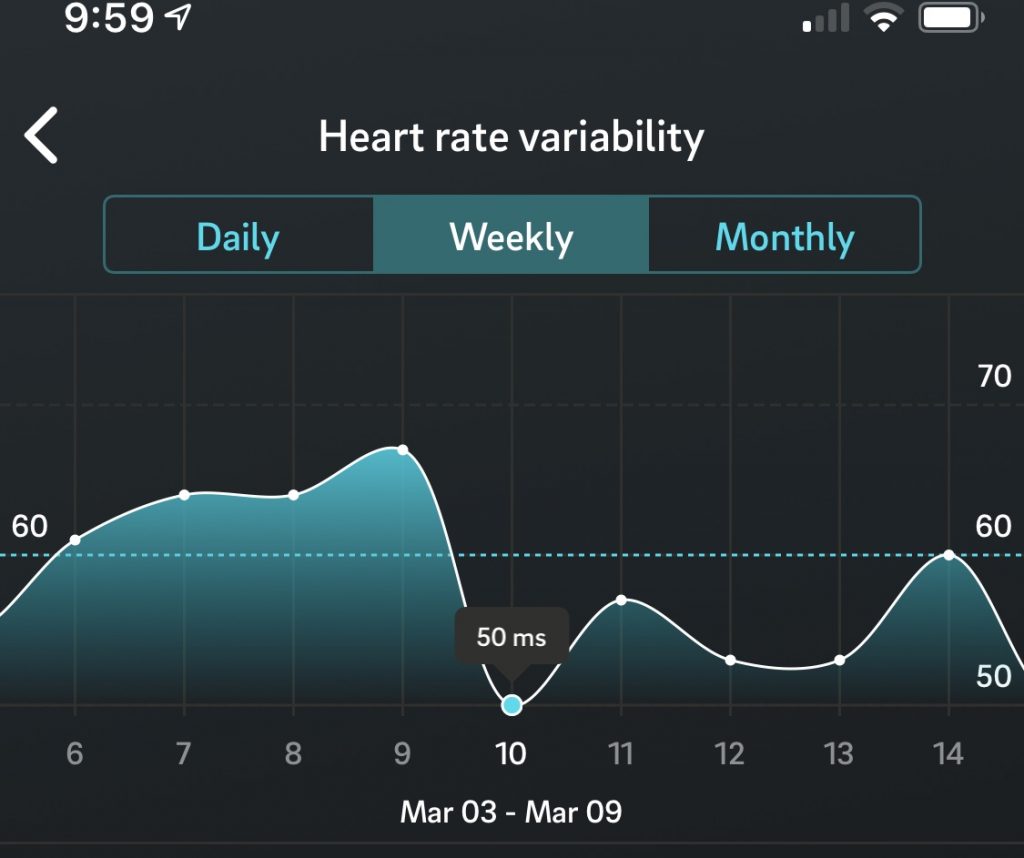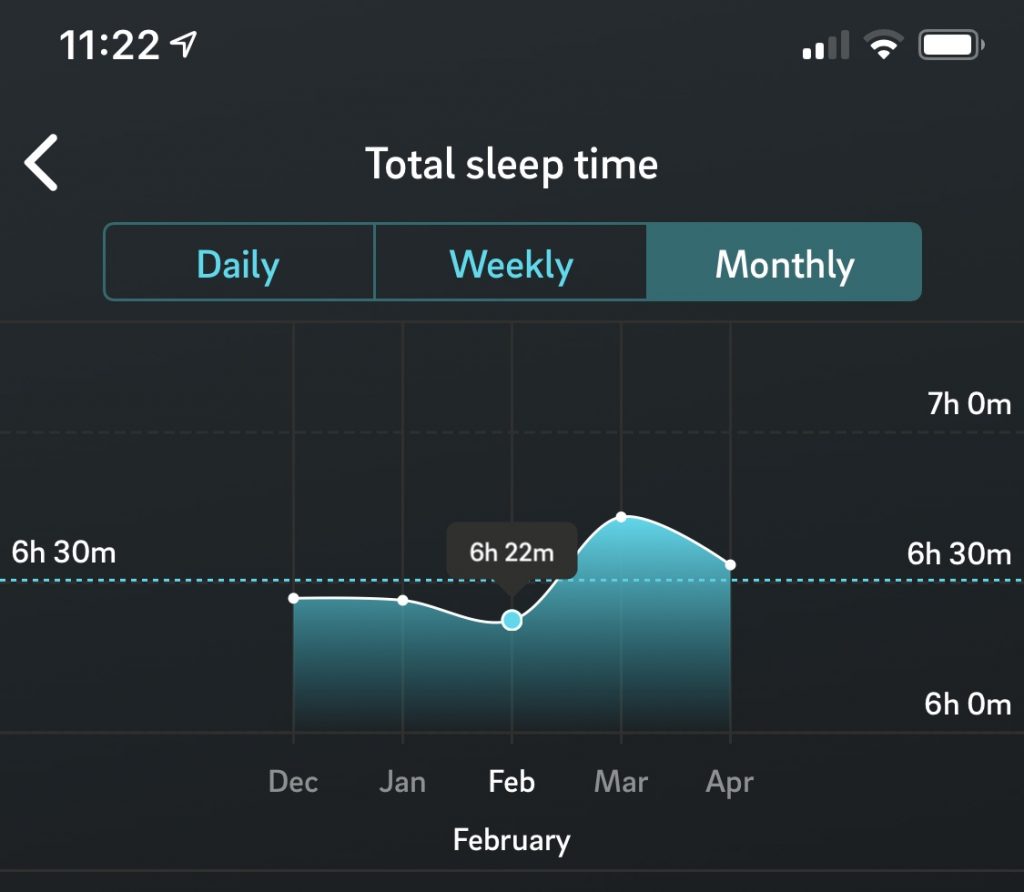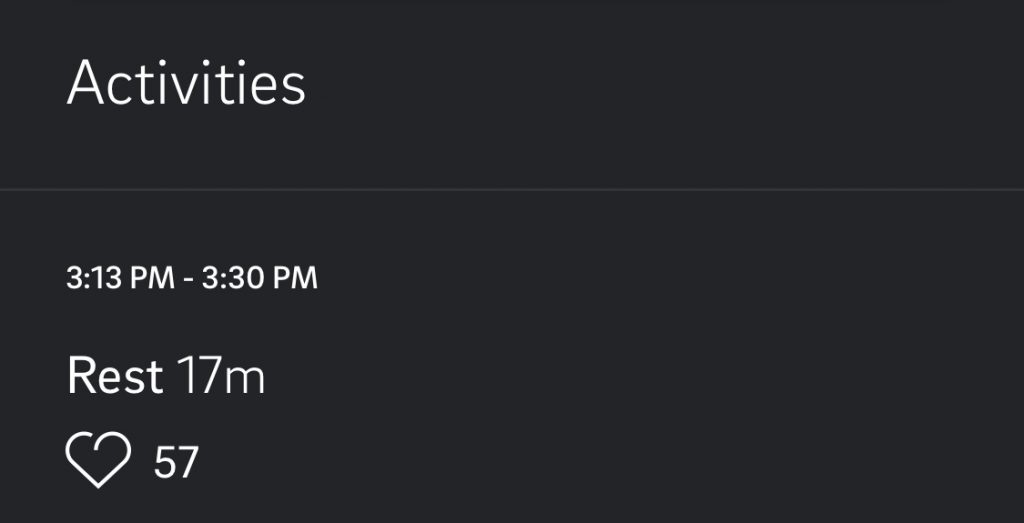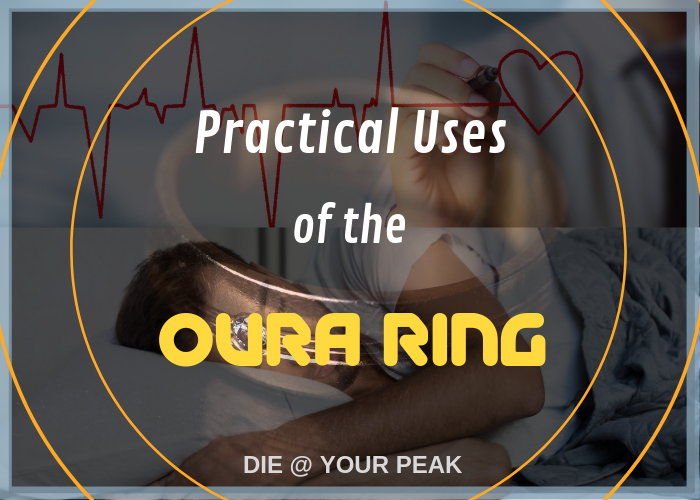Keeping track of things like your heart rate variability, resting heart rate, respiratory rate, body temperature, and physical activity can be interesting and as time goes by, you may notice trends that you can take action on. For example, I noticed that after March, my overall heart rate variability was trending down, a negative sign of health as a higher HRV than your baseline is a sign of good health and recovery.

Why did my HRV drop after February? Was it because I made a new years resolution to clamp down on alcohol consumption which lasted until March (somewhat true)? Maybe, maybe not, but it’s interesting to test these assumptions to see what activities impact your vitals. But that’s really not why I would purchase the Oura ring. I use the Oura ring mainly to motivate me to improve my sleep.
Sleep as the Number One Cognitive Enhancer
When somebody tells me that their workout sucked more than usual because of X. Where X is the food they did or didn’t eat, the supplements they took or the time of day they performed the workout and other crap, often times if you question them about their previous night’s rest, I’m willing to bet that they will tell you they didn’t get a great nights sleep.
Name nearly any popular health ailment and lack of sleep can be associated with it. Whether it’s diabetes, cancer, stress, inflammation, depression or just being slow mentally, improving your sleep will help.
The days of bragging about pulling all-nighters for work or school are over. Not for everyone though, I still encounter the proud “workaholic” or “I only slept 4 hours last night” guy. To each their own but I find myself much more effective at work and in life when I get a good night’s sleep. Days are smoother and brighter. I’m more creative and less annoyed by the annoying things
Because of the practical and noticeable benefits of good sleep in your everyday life and activities, I put the improvement of sleep as a top priority for me. The Oura Ring helps motivate me to sleep better.
What Good Is Motivation to Get Better Sleep?
The Oura Ring keeps track of your sleep stages as well as your heart vitals when you sleep. There is a debate on whether the Oura Ring’s sleep stages are accurate. I haven’t compared the Oura Ring to Polysomnography (PSG), the gold standard in sleep tracking, others have.
It’s a fact that deep sleep and REM sleep are very important to your body and brain, but I personally don’t care if the accuracy of the sleep stages is off. I care more about how I feel after a good night’s rest. Some people require more deep sleep or REM sleep than others. It really depends on what your goals are and your recovery needs.
The trends and sleep patterns are what I find interesting. How many days after a hard weekend of partying or drinking does it take for me to get back to a normal pattern of sleeping? How often do I wake up in the middle of the night and what causes me to wake up sporadically? When sleep is consistent, what causes my HRV lower and RHR to be higher during sleep. These are questions that the Oura Ring helps me answer. Optimizing these numbers or trying to optimize them has steered me into making better health choices even if these numbers aren’t perfect.
Consciously making decisions on when I sleep, what I eat and drink before I sleep and how activities, supplements or diet affect my sleep has made a big difference in how I approach and analyze sleep. Can I technically do this without an Oura Ring? Of course, but having the Oura Ring produce the data for you makes everything convenient and easier.

The Oura Ring as An Activity Tracker and The Readiness Score
The Oura Ring tracks your activity like your calories burned, steps and inactivity status. I already have the Apple Watch for the purpose of activity tracking and I think the watch does a much better job at it.
The readiness score is somewhat interesting and when something is way off, I use it to look at what might have affected the score negatively or positively. Besides that, I don’t use the score to determine how “hard” I go when I work out or whether I should take an activity recovery or rest day. This may change as I learn more about it and how the readiness score affects my training. For now, I intuitively use how I mentally and physically feel to determine the intensity of my workouts.
Things The Oura Ring Does Well
Some people have written about how the Oura Ring inaccurately registering reading or resting to sleep. I haven’t had this problem and I read before I sleep every night. It also registers any nap as “rest” which I am fine with.

Personally, the Oura Ring is able to track when I sleep and when I wake up pretty accurately which is more so than the sleep apps I have tried with the Apple Watch. The Oura Ring also has great battery life (4-6+ days for me until I need to charge it).
You can also put the ring in airplane mode and it will still track your vitals. A nice plus for those who believe that electromagnetic pollution is having a negative health effect on all of us.
Conclusion
The Oura Ring has had a net benefit to my life and how to approach sleep. For that dopamine hit, I also look forward to seeing my sleep data every morning. If the Oura Ring broke I would miss it and I would replace it. I’m a simple guy and because of these simple reasons, I’d recommend the Oura Ring for anybody interested in improving sleep.

Great write up. I’ve been scouring the web for reviews as I’m pondering a purchase, and this hit the nail on the head with almost everything. The only thing I would love to have seen is a comparison of the data produced (activity and sleep, HRV) between Oura and the Apple Watch.
As you allude to, it’s the trends that matter most, and if Oura is 10% lower than the Watch in tracking activity, or 20% higher than the Watch in counting hours asleep, matters less as long as it’s consistent. All trackers measure slightly differently, so even a Fitbit and a Watch can give very different results – and that’s OK. But it has to be consistent if trends are to be trusted.
Great idea, will gather the data and information for the comparison!